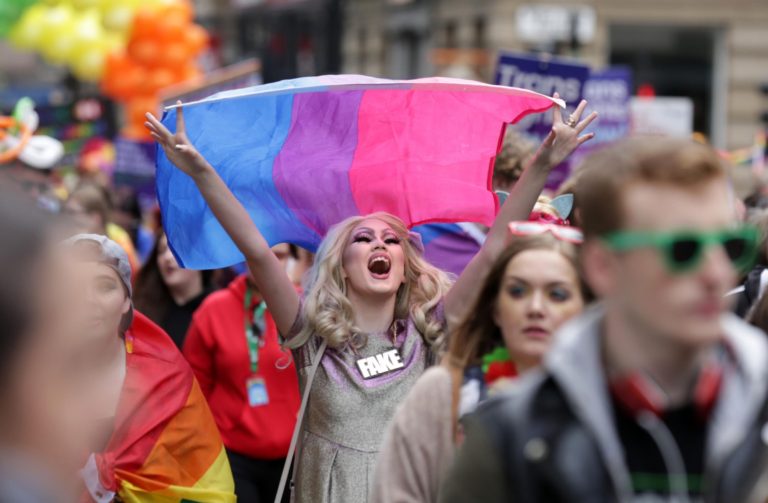

IT’S hard to square the SNP’s manifesto claim that they have been “leading Europe on LGBTI equality” when the past five years under their watch would be better characterised as a deeply difficult and at times traumatic period for Scotland’s transgender community – particularly when much of that hardship has come as a direct result of the party’s inaction on tackling transphobia within its own ranks.
While Scotland did top the Europe Rainbow Index in 2015, the intervening years have seen our nation slip down the league table to find itself resting behind Malta and Belgium. What victories for LGBT liberation there have been over the past parliamentary term, while important, have often been closer to symbolic displays of progress than any meaningful root reform.
When Scotland’s ranking first began to slip in 2017, the party pointed to the fact that certain equalities laws remained reserved at Westminster as a reason that progress had stalled. Yet it was Malta’s progressive transgender recognition laws that had pushed the country ahead of Scotland on the index; an area the Scottish Government absolutely has the means to legislate within, and which it has repeatedly delayed acting on.
The story of Gender Recognition Act (GRA) reform in Scotland under the SNP has been a tale of delay, discarded public consultation, misinformation and regrettably weak leadership.
Long before the global pandemic pushed plans into the long grass, the party had already walked back on legal recognition of non-binary identities, lowering the age at which someone could have their gender legally recognised, and fully eliminating the two-year waiting period before someone could apply for a gender recognition certificate.
The SNP have committed in their manifesto to working with a range of groups to work out which course the legislation will take next, but considering these walkbacks occurred despite a public consultation showing a majority of Scottish respondents backed each of these key legislative updates, you can understand why there would be scepticism over what direction it will proceed in.
Which isn’t to say that the upcoming proposals will not be a return to form for a party that once prided itself on the role it played in pushing forward progressive legislation. However, as it stands, the LGBT community is being asked to take the Brexit Gamble and vote on a blind promise that reform will happen with no real information on what it will look like.
While the First Minister is saying all the right things when it comes to improving the lives of transgender and non-binary people, that means nothing without action. As the old suffragette motto goes, “deeds, not words” will be the mark of meaningful change.
Despite her public intervention following a spate of resignations over the lack of seriousness with which complaints of transphobia were taken, it would be difficult for me to point to anything that signifies a real cultural change within – and that’s something that has only become more obvious in part due to defections to the Alba Party.
The storm surrounding comments that were reportedly made at the Alba Party’s women’s conference, regarding LGBT organisations attempting to lower the age of consent, allegedly came from someone who had been sitting until very recently on the SNP’s policy development committee.
Margaret Lynch was widely reported to have made the claim during the conference, and while the party initially defended its candidate as backlash grew, several days later it denied outright that it had ever been said – a claim that could be verified if they released a video of Lynch’s speech at the meeting.
However, while Lynch’s statements are contested, what is entirely verifiable is that Neale Hanvey, an MP who defected from the SNP to join Alex Salmond’s party, shared on his Twitter account a blog post alleging that the SNP have channelled public funding to voluntary groups that advocate lowering the age of consent to 10. The claim was later thoroughly debunked by The Ferret.
Many who repeated it online were perfectly at home within the SNP for years, festering like a gangrenous limb.
In many ways, the Alba Party have cleaned house for the SNP, potentially giving it a fresh start. Equally though, it has also allowed the party to wash its hands of many radicalised activists without ever truly having to come to terms with why such an element was able to flourish under the banner of the Scottish National Party for so long.
I RECOGNISE the difficult work that the LGBT and youth groups within the SNP have done to steer the party toward progress on these issues, not to mention the outspoken parliamentarians who have taken their colleagues to task.
I know how difficult this period has been from having spoken with many of those who were so scunnered by the party that resignation was their only course of action, not to mention of course how hard it has been on the trans community itself.
But to rebuild trust with the LGBT community we need a lot more than platitudes. The manifesto was an opportunity to make a bold statement of intent, and it’s frustrating that it has, in my opinion, missed the mark.
Even in terms of banning conversion therapy, the SNP has opted to wait for Westminster before making any moves of its own in contrast to the manifesto promises of both the Scottish Greens and the Liberal Democrats who want to act now.
The SNP are right that Westminster still holds enough power to get in the way of some equalities legislation though – but what would be the point of taking that power if we aren’t going to use it? I do think there is hope for the SNP yet, but they have a long way to go to rebuild the bridges they have burned over the past five years.